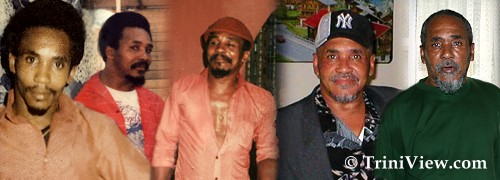|
|
Winsford 'Joker' Devine Speaks
01 | 02 | 03 | 04 | 05 | 06 | 07 | 08 | 09 | 10 | 11 | 12 | Next >
TriniSoca.com Reporters
Recorded: on July 19, 2007
Posted: September 12, 2007
Creator of such Calypso gems as "Progress", "In Time to Come", "Somebody", "Steelband Woman", "Saltfish", "This World Don't Like Nothing Black", "Phillip My Dear", "Take Me Back Africa", "Too Young to Soca" "In Time to Come", "Save our Domestics", Winsford 'Joker' Devine is undoubtedly one of the greatest songwriters of our time. His compositions range from the bacchanal and sexual topics of the Soca genre to the serious social commentaries that analyse and enrich our social space. Over the past 40 years, his compositions have been sung by many singers including 'Crazy', 'Sparrow', Machel Montano, 'Singing Francine', 'Mighty Trini', Charlene Boodram, 'Sugar Aloes', Marcia Miranda, Karen Asche, 'Poser', 'Baron', 'Explainer', 'Blakie' and 'King Austin'. Many of these songs have become classics of the Calypso artform, but in an arena where most of the public recognition goes to the singer, many persons are unaware of Joker's involvement. In this extensive interview with TriniSoca.com, this prolific Soca/Calypso composer talks frankly and vividly about his compositions, the state of the Calypso artform and his general life experiences.
TYEHIMBA: A couple of months ago, we did a review on the book that was written on your work. That was when I was first exposed to most of the work that you did.
We would like to begin with your early days. Could you tell us where you born and where you grew up?
WINSFORD: I was born and grew up in Morne Diablo, South Trinidad. I migrated to Port of Spain when I was about twenty-six years old. I attended the Morne Diablo R.C. School. I spent one year at a technical school in South and then I dropped out. That is it in terms of my basic education, barring what I did for myself after that, I was self-taught.
MR. DOUGLAS: What year were you born?
WINSFORD: I was born on 15th August, 1943.
TYEHIMBA: In terms of music. Were you very interested in music during your childhood?
WINSFORD: Yes I was. I remember when I joined a little Steelband. The captain of the Steelband was a cousin of mine. He introduced me to basic music. Interestingly, he started to teach me music from since I was a little child. He taught me how to read and write music. He also had a little combo side and he used to play the guitar and the banjo. After that, all the music I knew was self-taught.
MR. DOUGLAS: How long were you associated with him?
WINSFORD: I was associated with him until I became a semi-adult. I played in his Steelband for quite a few years as a child. I knew him as Mano. He was special amongst the country people. He knew how to read music and he could have played four or five different instruments. I was very fortunate.
MR. DOUGLAS: What was the name of that Steelband?
WINSFORD: I do not think they ever had a formal name as such. Back then they were a little village Steelband based in Morne Diablo.
TYEHIMBA: What was happening in the Steelband Movement at that time?
WINSFORD: The Steelband Movement wasn't far advanced in those days. One of the best bands that I knew in Trinidad was called Southern All Stars. There was a guy from Southern All Stars called Theodore 'Theo' Stephens. He is a Steelband pioneer. In those days I wasn't exposed to Port of Spain culture. I was from the deep country and I didn't know anything about town. Even though Southern All Stars was around in those days, I didn't know anything about that.
TYEHIMBA: What was happening in terms of the early Calypso scenes?
WINSFORD: In those days, I grew up knowing about 'Sparrow'. He was a major Calypsonian and I sang all of his Calypsos when I was a boy. I remember a little village concert that was held with people like 'Shorty', 'Magic' and a fella called Yule Bryner who used to be around in those days too.
I remember some Jamaicans who came in from Jamaica and they had a little side doing concerts from village to village. Once the village had something like a little hall they would use it and charge a small entrance fee. Back then we had people like 'Magic', 'Shorty', 'Bitterbush' and 'Composer'. Both 'Composer' and his sister used to be in charge of the group. I do not know what exactly their function was but it seemed as though they were the officials of the group.
TYEHIMBA: In terms of Morne Diablo, what was growing up there like?
WINSFORD: It was a vibrant cultural town. We used to do a lot of acting like stick-fighting and so on. There was a group that used to beat African drums for stick-fighting and so on. That was it culturally because it didn't have anything else more than that. After I left Morne Diablo it became a big force in the Best Village.
Continue...
01 | 02 | 03 | 04 | 05 | 06 | 07 | 08 | 09 | 10 | 11 | 12 | Next >
|

|
